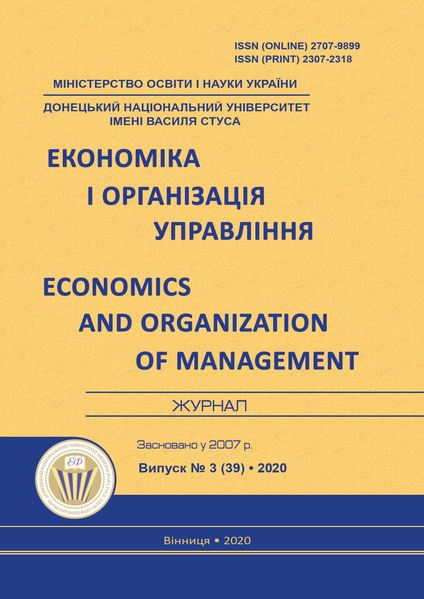Mechanism of efficient functioning of enterprises: tax aspect
DOI:
https://doi.org/10.31558/2307-2318.2020.3.11Keywords:
efficiency; taxation system; tax mechanism; business stimulation; business development; enterprisesAbstract
Efficient functioning is the goal of both macroeconomic and microeconomic entities. Achieving indicators that demonstrate efficient functioning depends on many factors. One of the tools that ensures effective functioning is the tax system and tax policy in general. The taxation system should be such that not only ensures stable budget revenues, but also takes into account the characteristics of business entities and stimulates their development.
Both large joint-stock companies and small enterprises have a certain level of tax obligations, the performance of which is reflected in the financial and economic indicators of the enterprise. Taking into account the fact that achievement of efficiency is a complicated mechanism of interrelations, it is important to consider the impact of the tax aspect on ensuring high results of financial and economic activity. The article is devoted to the mechanism of efficient functioning of enterprises. The principles of this mechanism are defined, as well as the structural elements of the organizational system for ensuring the development of small business at the state and regional levels. The directions of improvement of normative-legal support are considered. The tax mechanism of stimulation of economic entities was developed.
References
Карпова Т.С. Концепція механізму взаємообумовленого розвитку малого бізнесу та соціальної сфери. СХІД. 2013 № 6 (126). С. 99-104.
Battilana, J., and T. Casciaro. Change Agents, Networks, and Institutions: A Contingency Theory of Organizational Change. Academy of Management Journal. 2012. 55 (2): p. 381– 398.
Medium-Sized Businesses: A Demand Perspective. Entrepreneurship & Regional Development 15 (3): 229–252. GEM (Global Entrepreneurship Monitor). 2014. Informe GEM España 2013. Red Española de Equipos Regionales . http://www.gemconsortium.org/.
Національна програма сприяння розвитку малого підприємництва в Україні URL: http://www.kmu.gov.ua/control/uk/publish/article?art_id=246628657&cat_id=244276429
Carrasco-Monteagudo, I., and I. Buendía-Martínez. 2013. “Corporate Social Responsibility: A Crossroad between Changing Values, Innovation and Internationalisation.” European Journal of International Management 7 (3): p. 295–314.
Вишневський В.П. До питання про ідею єдиного податку. Фінанси України. 2000. №7. С.11-17.
Чубарева Л.И. Этапы формирования в Украине механизма налогообложения субъектов малого бизнеса: противоречия и механизм их разрешения. Економіка, менеджмент, підприємництво: збірник наукових праць. 2005. №14 (1). С. 253 – 259.
Карпова Т.С. Роль налогообложения субъектов малого бизнеса в развитии социальной сферы. Фінансовий і банківський менеджмент: досвід та проблеми: тези доповідей і виступів XIV Міжнародної наукової конференції студентів і молодих вчених Донецьк: Юго- Восток, 2012. C. 121-123.

